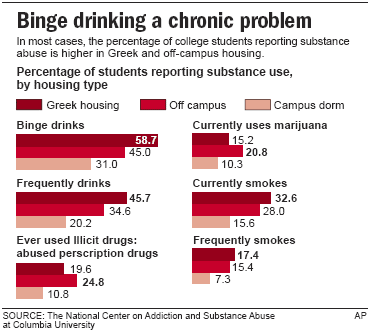The two topics of privatization and alcohol abuse among college students may seem completely separate, but it is possible that one could be a result of another. "According to Community Guide rules of evidence, there is strong evidence that
privatization of retail alcohol sales leads to increases in excessive alcohol consumption" (Hahn et. al.). The study finds that privatizing the sale of alcohol leads to increases of consumption across the board, no matter which type of alcohol is privatized. This is due to less government regulation and interference. Government control over the sale and regulation of alcohol generally decreases consumption, and when it becomes privatized, sales and consumption skyrocket. Alcohol abuse, as the number one cause of preventable death and disability, should be regulated by the government in order to cut down on the massive toll that the substance takes on the US population, especially among students. The increasing trend among states to leave alcohol sales in the hands of the businesses that sell it is a concerning, yet unsurprising fact when looked at as a whole. To me, it just seems as though we as a society are more interested in making money than protecting other human beings.
http://www.thecommunityguide.org/alcohol/Privatization_EvidenceReview.pdf
http://www.thecommunityguide.org/alcohol/RRprivatization.html
Tuesday, October 13, 2015
Research Blog #2: Scouting the Territory
I've decided to keep on with my original idea of alcohol abuse among college students. What I've found from searching is a multitude of scholarly articles about the subject, which tells me that this is a subject that has been researched a lot and that I should be able to find more than enough data to write about this topic.
One of the images I stumbled upon was a graph that showed a correlation between Greek/Off Campus housing and higher rates of drinking. This is something that I found an interest in. As someone that's lived in an on campus dorm, a fraternity house, and an off campus house, I found the graph to be rather relatable to my own experiences. The setting of an on campus dorm and the authority figures (RAs, etc.) that are making sure you behave make it so that it will be much less likely that you'll drink. However, I also know that this doesn't stop most people and that many times the only way that people will be discouraged from drinking in dorms is when they face disciplinary action.
One of the most cited scholarly articles about this topic is called "Alcohol Abuse and Dependence Among U.S. College Students". This paper is based on a study of over 14,000 students at 119 different 4 year universities. The factual data that this paper contains should be a huge tool in creating a backbone of my argument based on verifiable facts.
Most people have come to the same conclusion about alcohol use in college: College students drink too much. This isn't a controversial topic. However, some of the ideas for ways to fix the problem are. For example, the national drinking age of 21 has long been disputed. Some people believe that exposing alcohol to youth earlier in life will remove some of the mystique of the drink, while others argue that keeping alcohol out of the hands of minors for as long as possible is the only way to keep them safe.
One of the images I stumbled upon was a graph that showed a correlation between Greek/Off Campus housing and higher rates of drinking. This is something that I found an interest in. As someone that's lived in an on campus dorm, a fraternity house, and an off campus house, I found the graph to be rather relatable to my own experiences. The setting of an on campus dorm and the authority figures (RAs, etc.) that are making sure you behave make it so that it will be much less likely that you'll drink. However, I also know that this doesn't stop most people and that many times the only way that people will be discouraged from drinking in dorms is when they face disciplinary action.
One of the most cited scholarly articles about this topic is called "Alcohol Abuse and Dependence Among U.S. College Students". This paper is based on a study of over 14,000 students at 119 different 4 year universities. The factual data that this paper contains should be a huge tool in creating a backbone of my argument based on verifiable facts.
Most people have come to the same conclusion about alcohol use in college: College students drink too much. This isn't a controversial topic. However, some of the ideas for ways to fix the problem are. For example, the national drinking age of 21 has long been disputed. Some people believe that exposing alcohol to youth earlier in life will remove some of the mystique of the drink, while others argue that keeping alcohol out of the hands of minors for as long as possible is the only way to keep them safe.
Tuesday, October 6, 2015
Research Blog #1
The topic that I chose to research is alcohol abuse among college students. There is no doubt that college students are among the leaders in binge-drinking and alcohol consumers in this country. By researching this topic, I'd like to figure out exactly why college students are prone to alcohol abuse, how students are impacted by alcohol consumption, and what could be done to lower the rates of alcohol abuse in the future. This is a topic that I think most, if not all college students can relate to somehow. I believe that there is most likely a variety of social and psychological reasons for over consumption, and I'd like to be able to bring some of these reasons to light.
Subscribe to:
Comments (Atom)
